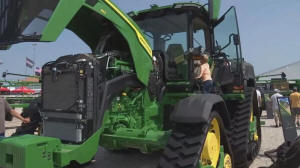|
An AI farms project at the University of Illinois has trained a
language model to answer agricultural crop questions. School
officials said the Artificial Intelligence for Future
Agricultural Resilience, Management, and Sustainability
Institute will serve as a nexus for multidisciplinary research
teams that advance foundational AI and use the advances to
address important challenges facing world agriculture.
A Chicago-based nonprofit is pioneering AI Agtech for
smallholder, subsistence farmers in some of the poorest parts of
the world. Opportunity International launched Ulangizi, which
means “advice” in English, for farmers in Malawi who have
questions about best practices for their crops or farm animals.
Neatleaf has invented a fully autonomous robotic platform called
the Spyder, which scans crops in the greenhouse and generates
data points on plant health and growth. This data is analyzed
and turned into actionable insights for the cultivation team to
assess, monitor, and remedy.
"Farmers can only make educated guesses on the health of their
crops based on what the human eye can see, but often, when
problems arise, it's too late to save the crop,” said Neatleaf
founder Elmar Mair. “Our technology uses AI to spot potential
problems long before they reach a critical stage, allowing
farmers to make necessary adjustments to improve plant health."
The Spyder is being used in the cultivation of marijuana, but
Mair hopes to expand uses of the technology outside of the
greenhouse, such as a vineyard.
AI is being used for pest control. For example, Trapview has
developed a device that traps pests and identifies them. The
device attracts pests, which are photographed by a camera. AI
then identified over 60 pest species which can damage crops.
Madhu Khanna, professor of Environmental Economics at the
University Illinois, said it may take some time for farmers to
fully trust AI technology.
“Handing over the charge for how to manage a farm to a robot is
going to take some level of adaptation,” Khanna said at the
100th annual U.S. Department of Agriculture Agricultural Outlook
Forum last March. “Many of us would be very reluctant to let a
robot make investment decisions over our life savings instead of
having a financial adviser and that’s the kind of thing you can
imagine for a farmer would be very similar.”

|
|





